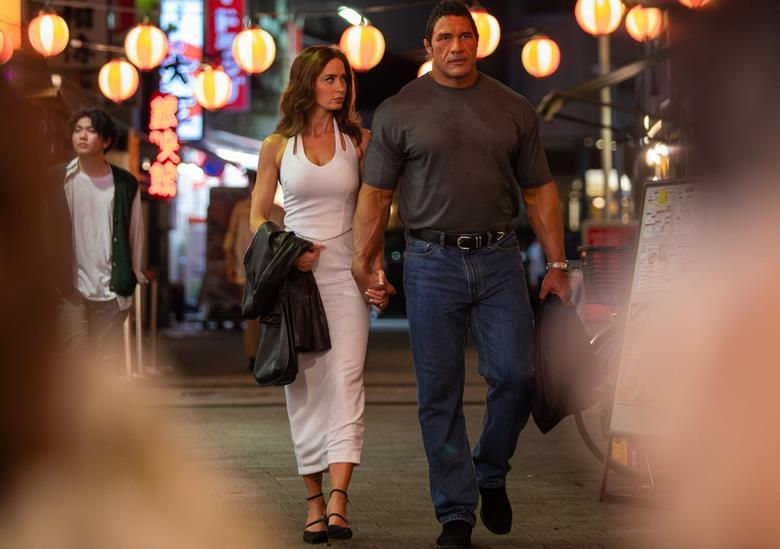Screen Time | Smashing! The Reinvention of Dwayne Johnson
- andreasachs1
- Oct 3, 2025
- 4 min read
By Laurence Lerman / New York City


In The Smashing Machine, which arrives in theaters on October 3, filmmaker Benny Safdie (Good Time, Uncut Gems) does something audacious: he transforms Dwayne “The Rock” Johnson, the tremendously popular professional wrestler who became a box-office superstar. For two decades, Johnson has been Hollywood’s most reliable skyscraper-scaler and franchise defibrillator, a star who could charm his way through fireballs and punchlines with equal ease. Here, that invincibility is stripped for parts. What’s left is Mark Kerr—a mixed martial arts (MMA) pioneer and former amateur-wrestling phenom—whose body is a fortress and whose interior is falling apart.
Based on the 2002 documentary of the same name (subtitled The Life and Times of Extreme Fighter Mark Kerr), Safdie’s solo feature (he writes, directs, co-produces, and edits) follows the protagonist through the late-’90s boom of mixed martial arts: the high-wire bouts, the Pride Fighting Championships in Japan, the adoration, the pills. The fights are gripping, but Safdie keeps them deliberately deglamorized—glimpsed through ropes and mesh, cut in stressed fragments, sound-mixed like a migraine. The real arena is domestic: motel rooms at 3 a.m., the post-fight quiet that feels like aftershocks, the emotional bouts that don’t end with a bell.
Johnson, prosthetically augmented and reshaped into a different silhouette, gives the most internalized performance of his career. The trademark voltage—eyebrow, grin, the knowing wink—goes dark. In its place: a man who speaks softly because he’s afraid of what will come out if he raises his voice. He plays Kerr as someone unused to vulnerability and suddenly drowning in it; you can see him trying to muscle through feelings the way he once muscled through opponents, only to discover there’s no gym for this. It’s a risky performance, and Johnson makes it count.

As Dawn Staples–Kerr’s partner in love and, at times, in tempestuous battle–Emily Blunt is flinty, funny, and heartbreakingly practical. She refuses the “long-suffering wife” cliché, giving Dawn sharp edges and quick intelligence. Their scenes crackle with recognition—two people who love each other and also know exactly where to land the blow that will hurt most. The pair generate an electricity that’s less flirtatious than combustible: a match struck in a windstorm.
Safdie’s sensibility—pressure-cooker humanism—evolves here. Unlike the sprinting panic attack of 2019’s Uncut Gems, this one is a slow bleed: a film that prefers the minute hand to the stopwatch. He collages archival inserts, handheld passages, and training-room textures into something that feels lived-in rather than lacquered. The editing is jagged but not showy; the images have that humid, close-quarters claustrophobia of a life that no longer fits. Safdie resists the easy arc: The Smashing Machine shows that rock bottom isn’t a single floor but a series of falls; recovery, when it comes, is rarely cinematic.
What the movie captures best is embodiment—the miracle and misery of being a “machine.” Kerr is paid to convert pain into spectacle, to turn willpower into a public utility. Safdie is fascinated by the bill that comes due: the opioids that sand down the edges until there’s nothing left to feel, the way fans celebrate the mask long after the man underneath has disappeared. Johnson leans into that paradox with humility; even in triumph, he plays Kerr as a figure slightly out of phase, like the sound is a half-beat off the image.

There are soft spots. A couple of contemporaries drift in and out as sketches; one subplot hints at a wider locker-room ecosystem but never fully arrives. Yet even the elisions feel consistent with the subject: Kerr’s life, as presented here, is full of fragments—half-remembered wins, rehearsed apologies, plans that dissolve in bright light. Safdie’s refusal to tidy the narrative is starkly evident and effective.
Does The Smashing Machine rewrite the sports biopic? Not entirely. The genre’s bones remain: the ascent, the cliff, the reckoning. But Safdie sands off the triumphal lacquer and replaces it with something more tactile—sweaty, anxious, human. The climaxes don’t play as crescendos so much as consequences. And the big swing—the deconstruction of one of the world’s most colossal movie personas—lands.
The film debuted at the Venice Film Festival last month, awarding Safdie the Silver Lion, a validation from the most discerning voices in the festival biosphere and a signal that this isn’t just a tonal flex for Johnson (who cried at the film’s 15-minute standing ovation) but a real career pivot.
Five, ten, fifty years from now, when the Dwayne Johnson retrospective inevitably arrives, the skyscrapers and capes will still gleam. But the aforementioned pivot will start here, with a film that asked him to stop being a god and try being a man. The machine smashes, yes, but the man survives. That’s the win.

Laurence Lerman is a film journalist, a former editor of Video Business--Variety's digital media trade publication—and husband to The Insider's own Gwen Cooper. Over the course of his four-decade career, he has conducted one-on-one interviews with just about every major filmmaker working today, from Martin Scorsese, Quentin Tarantino and Clint Eastwood to Kathryn Bigelow, Bernardo Bertolucci, and Werner Herzog. Most recently, he is the co-founder and editor-in-chief of the online review site DiscDish.com, the founder and curator of FilmShul.com, a multi-part presentation on the history of Hollywood and Jewish America, and a commentator on various 4K UHD and Blu-ray home entertainment releases.
Great analysis of a performance and film that I now want to see!
Another incredible review from Laurence Lerman. Admittedly not my typical genre, but this deep dive review is making me really want to see this film. Keep 'em coming!
Just LOVE that you're back and insightful as always!